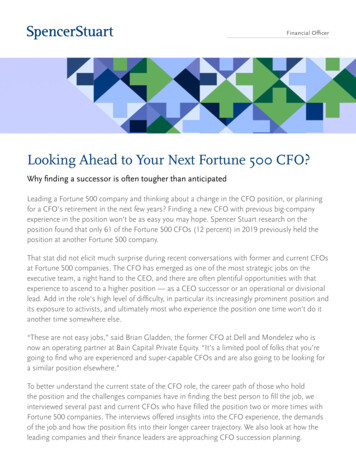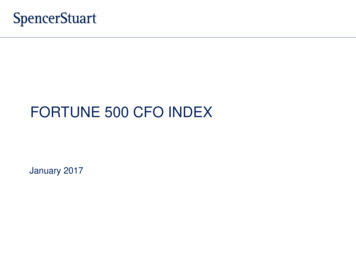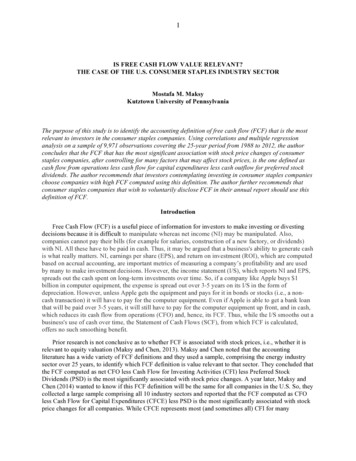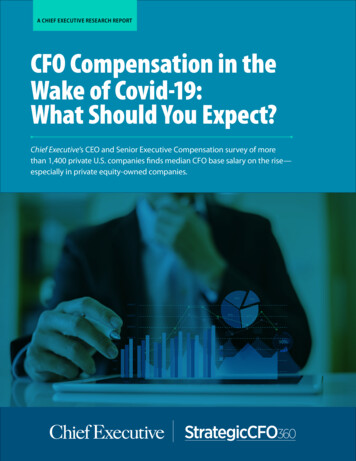
Transcription
CFOBarometerReport
Executive summaryThe global economic outlook is more optimistic than expected.The majority of respondents assess their company’s financial performance in 2012 positively. CFOs in Asia and SouthAmerica are particularly positive about the economic outlook. CFOs in North America only expect muted economicgrowth, while European CFOs expect economic output to shrink in the course of the Eurozone crisis.Older CFOs earn more.CFOs from every region of the world fall into a roughly similar age bracket, in particular, 72% are between 35 and 49years of age. The age distribution within this range is relatively even. North America is the only region where CFOs aremarkedly older than the worldwide average: of the respondents surveyed, 39% are older than 50. This means that alarge number of CFO positions will have to be newly filled in North America in the next decade. In the other regions, theshare of CFOs in this age group is 20% or less.CFOs’ salaries vary greatly from one region to the next. However, age is linked to earning potential in every region:generally, the older the CFO, the higher the salary. Overall remuneration for US CFOs is higher than the globalaverage and incomes have a larger than average variable component. It takes markedly longer to become a CFO inNorth America, in fact, the starting age for a CFO is higher than the international average.In Europe, CFOs earn considerably less, with the variable salary component also being smaller.Furthermore, female CFOs, who are still markedly in the minority, tend to be found morefrequently in the lower income groups.Low share of women as CFOs worldwide(percentage of female CFOs, in % of respondents)Pacific18Asia1716Europe15North America5South AmericaSource: PageGroup
CFOs attain their position at a young age in Europe and South America.On average, CFOs worldwide attain their position between the ages of 30 and 39. More than 60% of CFOs surveyedassumed their current position at this age, while one in ten was younger than 30 when they became CFO.CFOs usually attain their positions between the ages of 30 and 39(respondents’ ages when they became CFO: in % of respondents)14327 3030 - 3435 - 391540 - 4432 45Source: PageGroupIn Europe and South America, CFOs on average attain their position at a much younger age than elsewhere. Almosthalf the CFOs surveyed in Europe were younger than 35 when they became CFO. In the Asia Pacific region, 30% ofrespondents became CFO before the age of 35. In North America, only one in five reached this position before the ageof 35.CFOs in Europe and South America attain their positions at younger ages(percentage of CFOs who were younger than 35 years old when they attained their position; in % ofrespondents in the respective region)Europe49South America43Asia3130Pacific21North AmericaSource: PageGroupCFOs are versatile, mobile and ambitious: many want to become CEO.Generally, CFOs have a broad range of responsibilities that frequently comprise more than management of their company’sfinance department. Many CFOs also manage administrative, legal or human resource functions. They work in closecollaboration with the CEO; 75% of respondents described their working relationship with the CEO as a partnership or a team.Many CFOs have ambitions to become CEOs. One in every five respondents expects to make this career move by 2014.More than half of CFOs surveyed expect to be working in the same role but have greater responsibility in the next two years.European CFOs are pessimistic about their own career prospects in the next two years, reflecting the negative economicsituation in Europe.Experience of working abroad is important to CFOs, particularly if they work in large companies. It pays off too, as CFOs whohave worked abroad tend to be among the higher earners. However, it is salary rather than international experience that is themost important factor influencing a CFO’s career planning. CFOs see themselves as needing to develop their communicationand presentation skills, almost half the respondents see themselves as needing to develop these areas further.
International experienceInternational experience is important.Many CFOs have international experience. Six in every ten respondents spent some time working abroad. More than20% of CFOs surveyed have more than ten years international experience. On the other hand, almost 20% kept theirwork experience abroad short, at a maximum of two years.A higher than average share of CFOs surveyed from Asia and the Pacific regions have international experience.Six out of ten CFOs have international experienceYears workedabroad191-238133-56-9822 10NoneCFOs’ international experience riseswith company sizeSize of company bynumber of employees% of CFOs withinternational experience1 - 9959100 - 49961500 - 999621,000 - 4,99967 500070Source: PageGroupSource: PageGroupDue to the current economic situation, European companies tend to have higher international orientation because thatis where the majority of growth opportunities are. This allows them to be less reliant on regional markets, or affected bytheir economic difficulties.Despite the European depression most CFOs described their own companies as doing relatively well.South AmericaCompany’s financial performanceEconomic situationEuropeCompany’s financial performanceEconomic situationAsiaCompany’s financial performanceEconomic situationNorth AmericaCompany’s financial performanceEconomic situationPacificCompany’s financial performanceEconomic situationSource: 20834136
In fact, the survey confirmed that over half of European companies rate the best business opportunities as beingoutside of their own region.International experience is therefore more important for European CFOs, as companies need people who understandforeign markets and cultures.CFOs in European regions tend to speak more languages and have more overseas experience than in the NorthAmerican or Pacific regions.American CFOs tend to go abroad less in the course of their careers. Only 50% of the North American CFOs and 57%of the South American CFOs surveyed can boast international experience. However, as with their Europeancounterparts, those North American CFOs who do have international experience tend to work abroad for longerperiods at a time.The larger the company, the greater the likelihood that the CFOs will have international experience. Amongcompanies with more than 5,000 employees, 70% of CFOs have worked abroad. At companies with less than 100employees, 59% of CFOs have worked in a foreign country. However, there is no discernible correlation between thelength of work experience abroad and the size of the company.CFOs’ international experience rises with company sizeSize of company bynumber of employees% of CFOs withinternational experience1 - 9959100 - 49961500 - 999621,000 - 4,99967 500070Source: PageGroupMore than half the respondents are prepared to leave their home country for career purposes.Today, changing locations or employers is part and parcel of CFOs’ career planning. In general, CFOs cannot avoid having torelocate in the course of their professional lives. For most CFOs, this does not pose a problem: more than half of respondentswere prepared to leave their home country for career purposes.In an international comparison, CFOs in North America and the Pacific region tend to be slightly less mobile. Roughly a thirdof CFOs surveyed in these regions are not prepared to move for career-related purposes. Of the two-thirds that areprepared to move, more are willing to relocate for a job offer from abroad than for a job offer in their own country.The higher the salary already achieved by CFOs, the greater their willingness to relocate abroad for their next career move.The highest level of readiness to move abroad for the sake of a good job is among CFOs aged between 30 and 34. Belowand above this age, the level of readiness drops. The older CFOs are, the less willing they are to relocate.
Financial expertise is not enough CFOs must be versatile.CFOs have a broad range of responsibilities.CFOs are frequently responsible for other departments as well as the finance function; 89% of the CFOs surveyed statethat they have additional responsibilities outside of the finance department. Seven in ten CFOs are also responsible foradministrative divisions, and almost five in ten for the legal and information technology (IT) divisions.CFOs are often also responsible for the administration andlegal and IT departments(functions also performed by CFOs; in % of respondents)Administration7149LegalIT48Human resources41Procurement & supply chainNoneOther301113Multiple responses possibleSource: PageGroupThe larger the company, the more frequently the CFO focuses exclusively on the finance department. Whereas in smallcompanies with fewer than 100 employees 94% of respondents are also responsible for another department, this sharedeclines to 78% in companies with more than 5,000 employees.CFOs are rarely responsible solely for the finance department(share of CFOs who are only responsible for the finance department; in % ofrespondents from the respective company size by employee numbers) 10069100 - 499500 - 999141,000 - 4,99919 500022Source: PageGroupAlmost eight in ten CFOs at large companies oversee other business areas as well. Half the CFOs surveyed in largecompanies are tasked with administrative duties, while 36% are responsible for IT.For CFOs at small companies, HR expertise is crucial.CFOs in small companies have to be particularly versatile. In these companies, the share of CFOs also responsible forgeneral administration, HR and the legal department is higher than average. CFOs in larger companies are far lessfrequently responsible for HR. In companies with fewer than 100 employees, six in every ten respondents are alsoresponsible for HR, whereas in companies with between 100 and 1,000 employees, only around three in ten CFOs havethis additional responsibility. In large companies, this share declines to only one in ten respondents.CFOs assume a wide variety of tasks in companies, and these go beyond the finance department as well. This enablesthem to gain skills and experience that prepare them for a higher level of company management.
Ambitious career goals requiremobility and lifelong learning.Many CFOs aspire to be CEO or managing director One fifth of CFOs surveyed expect to become CEO or managing director within the next two years. In South America31% of the CFOs surveyed expect this career leap. In North America and the Pacific region, on the other hand, only12% and 11% respectively, foresee opportunities for such advancement within two years. It is especially the CFOs inthe median age group between 35 and 49 who expect to become CEO or managing director in the near future.CFOs want greater scope of responsibility(where respondents see themselves in 2 years - either with their currentemployer or a new one; in % of respondents)46217Same positionSame position with a bigger scope20CEO or managing directorInterim managementOwnership or entrepreneurship51OtherSource: PageGroup but the majority only expect more responsibility in the next two years.More than half the surveyed CFOs have less ambitious career expectations for the next two years. They see themselvesin the same position, but with more responsibility. This is particularly true of CFOs with five years experience or less.More experienced CFOs are not ready to retire either: almost half the CFOs aged between 50 and 54 still expect anincrease in responsibility, as do 37% of respondents aged between 55 and 60.One in five CFOs over 60 expect to have more responsibility in their current position in the next two years. A particularlyhigh share of CFOs in Asia and in North America expect an increase in their responsibilities in their current position inthe next two years. In Europe, one-fifth of all respondents see no change in their position for the next two years; thehighest percentage of any region in our survey. Although European CFOs assess their company’s prospects as goodoverall, they are more pessimistic than average when it comes to evaluating their own career prospects.
Salary is paramount in career planning.Overall, salary is the overriding factor for CFOs when making further career moves. They take into account theemployer’s vision and strategy as well as their own work-life balance when selecting a new employer. In Europe andAsia, CFOs rank work-life balance behind the prospect of a role with greater scope when making career plans.Remuneration is by far the most important criterion for career planning, particularly in the case of younger CFOs.The older a CFO is the less important salary becomes. CFOs between 45 and 55 view the employer’s vision andstrategy as a more important factor. For those over 55, work-life balance becomes the most important concern.Better pay is the prime criterionEurope(criteria that will influence respondents’ career choices; in % of respondents)Compensation level5250Vision and strategy of your (future) employer42The prospect of a role with greater scopeNorth AmericaCompensation level6157Vision and strategy of your (future) employerThe prospect of a role with greater scope49South AmericaCompensation level5553Vision and strategy of your (future) employerThe prospect of a role with greater scope43PacificCompensation level5756Vision and strategy of your (future) employerThe prospect of a role with greater scope48AsiaCompensation level5953Vision and strategy of your (future) employerThe prospect of a role with greater scope48Multiple responses possible, maximum of three choicesSource: PageGroup
Communication and management strategies are top priorities for CFOs’ development.As in the 2011 European CFO Barometer survey, international respondents in 2012 identified communication andpresentation skills and strategy and general management as their top priorities for personal development.Communication skills require lifelong training(Competencies CFOs want to develop further)50Communication and presentation4653Strategy and general management382729Languages33Team management2418Marketing2316IT systems or softwareYears of experience as CFO25under 2 years26Education and financial certifications10 years and more13Multiple responses possible, maximum of three choicesSource: PageGroupCFOs aged between 40 and 50 are particularly focused on improving their communication and presentation skills.Further development in the areas of strategy and general management is especially important to younger CFOs under40. For both areas, a greater than average number of the less experienced CFOs assessed their developmentrequirements as high. However, even CFOs with long professional experience view the further development of theircommunication skills to be especially important. Older CFOs with more than average professional experience regardtheir IT expertise as in need of improvement.CFOs use social media for networking and further career purposes.A quarter of the CFOs surveyed in South America use social media to find new employees, making them the pioneersin this area by a wide margin. Asia is the only region where at least a fifth of the respondents state that they use socialnetworks to look for employees. CFOs worldwide tend to be active in social networks primarily to further their owncareers or to conduct networking with business partners. The number of CFOs who are not active in social networks atall fluctuates greatly from one continent to the next. In Europe, 41% do not use social media at all, while only 26% donot use them in Asia (North America 38%, Pacific 37% South America 31%).Networking and personal career take top priority in social media use(what CFOs mostly use social media for; in % of respondents)Networking with business partners42For personal career purposes42Looking for new employeesLooking for new clientsI do not use social media actively181038Multiple responses possible, maximum of three choicesSource: PageGroupOverall, the CFOs who are in the age group between 30 and 45 are the ones who use social media most frequently.However, they use these new media primarily for their own career purposes. Networking is most important to youngCFOs under 30, and they are the age group who use social media most frequently to look for new employees.
CFOs are leaders and viewthemselves as the CEO’s partner.Leadership role is not always a CFO’s top priority.Globally, 37% of the CFOs surveyed describe their management style as that of a leader. However, there aresignificant regional differences: outside Europe, CFOs emphasise their leadership role much more frequently;59% of CFOs in North America regard themselves primarily as leaders. In Europe, on the other hand, almost the samepercentage of CFOs see themselves as; developers’ (30%; leaders: 33%). CFOs with higher incomes and more yearsof experience are more likely to describe themselves as leaders. These individuals are more frequently employed inlarge companies.CFOs view themselves as leaders or developers(respondents’ own description of their management style; in % of rator30Source: PageGroupCFOs earning salaries at the lower end of the scale are more likely to describe themselves as ‘motivators’. Those withless experience as CFOs tend to define their management style primarily as that of a developer.CFO and CEO: partner or team.Generally, CFOs already work in close collaboration with the CEO in their current position. CFOs describe theirrelationship with the CEO in different ways: 39% of respondents said it was a partnership; i.e. they deal with the CEOas an equal. Only a marginally smaller share of CFOs, 36%, regard themselves and the CEO as a team.In large companies, CFOs see themselves as the CEO’s partner(respondents’ own description of relationship to CEO; in % of total respondents and by company size)1413Top down1636Teamwork29Partnership3410I act independentlyOther1011123839TotalLess than 100 employees2Source: PageGroupMore than 5,000 employees44
Overall, only 14% of respondents view themselves as being in a markedly subordinate position to their CEO. However,if the CFO is younger than 30, this share jumps significantly: around a quarter of the particularly young CFOs describetheir relationship with the CEO as top down. Conversely, with increasing years of experience, the share of CFOs whohave a strictly hierarchical relationship with the CFO declines noticeably.In large companies, a higher than average 44% of CFOs see their relationship with the CEO as a partnership, whereasin small companies with fewer than 100 employees, a higher than average 12% often act completelyindependently. However, even in SMEs the most common view, with 38 of responses, was for CFOs to describethemselves and the CEO as a team.Companies want to retain employeesand optimise processes and costs.Process and cost optimisation are the top priorities for CFOs.CFOs worldwide identify process and cost optimisation as the most important projects for their companies in 2012.While process optimisation is the top priority in North and South America, as well as in Europe, cost optimisation isviewed as most important in Asia and the Pacific region, meaning that the regional differences are surprisingly small.Processes and costs take top priority worldwide in 2012(company projects identified by CFOs as the most important in 2012; in % of respondents)Process optimisation7149Cost optimisationFixed cost reductions48Mergers & acquistions41ERP implementationTransfer pricing3011Multiple responses possible, maximum of three choicesSource: PageGroupIn 2012 reducing fixed costs is significantly more important to European firms than to companies in other regions. Ofthe European CFOs surveyed, 41 per cent regard this as their top priority in 2012, while in North America only 27% saidreducing fixed costs was their main focus. Cost reduction is particularly important to companies from the industrial,manufacturing and public sectors.Cost optimisation becomes more important as companies increase in size. Of the CFOs in small companies with fewerthan 100 employees, 63% said cost optimisation was one of their most important projects for the current year. As thenumber of employees rises, so does the share. In companies with more than 5,000 employees, 71% of CFOs surveyedreported that cost optimisation was a priority.
Changes seen particularly in large finance departments.The greater the number of employees in the finance departments, the smaller the number of CFOs surveyed who statethat no significant changes are planned in their department. If a department has fewer than ten employees, 42% ofCFOs expect no changes in 2012. However, if the finance department has more than 100 employees, only 22% ofrespondents expect no significant changes.Implementing new policies in finance departments will be key focus in 2012(changes in the finance departments in 2012; in % of respondents)Implementation of new ion74No significant changes35Multiple responses possibleSource: PageGroupFocus on employee retention in 2012.Training and development and employee retention, along with working atmosphere, are also key areas of focus forCFOs in 2012. Developing and retaining employees take top priority because of the tight labour market for qualifiedstaff in many regions of the world.Whereas in other regions of the world, employee retention plays a more important role than talent acquisition in 2012,North American companies view this differently. Among North American companies, a much higher than average 31%are focusing on talent acquisition in 2012, while only 20% prioritise employee retention. This fact is probablyattributable to the relatively high unemployment in the region, coupled with more relaxed labour laws making it muchless expensive to hire and fire than in other global regions.Workplace atmosphere is particularly important in the public sector – where it is actually the most important factoralongside training and development – and the energy sector, where the working atmosphere ranked second among theHR issues listed by CFOs.
AppendicesAppendix i – Methodology and data poolThe Michael Page CFO Barometer based on 4,388 completed surveys received from chief financial officers and financedirectors (collectively referred to as CFOs) worldwide. The survey was completed online and participants were invited totake part by email. Survey questionnaires were translated into local languages for each participating region.Appendix ii – breakdown of respondentsCountries or regions where respondents work(number of CFOs surveyed by region or country)Europe 2,863South America 680Asia 321North America 175Pacific 146Other 176Industries in which respondents work (in % of respondents)Industrial manufacturing2111Business servicesTechnology9Consumer Goods9Financial re2Public sector/non-profit1Other18Source: PageGroupSize of companies at which respondents work(number of employees; in % of respondents)Legal structures of companies at whichrespondents work (in % of respondents)22914341 to 99100 to 499ListedState owned500 to 99911661,000 to 4,99932Source: PageGroupPrivately Owned28 5,000Source: PageGroupNon-profit
large number of CFO positions will have to be newly filled in North America in the next decade. In the other regions, the share of CFOs in this age group is 20% or less. CFOs' salaries vary greatly from one region to the next. However, age is linked to earning potential in every region: generally, the older the CFO, the higher the salary.










